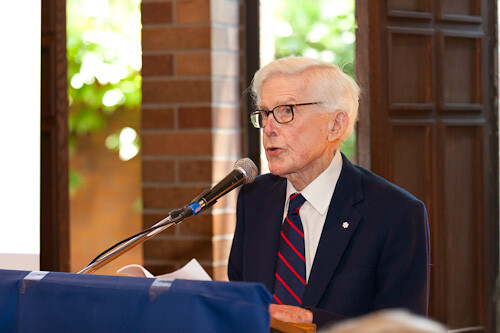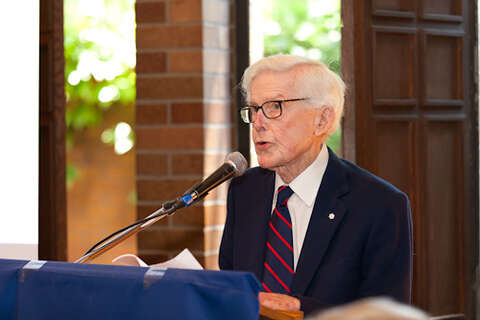Mobile Menu
- Education
- Research
-
Students
- High School Outreach
- Undergraduate & Beyond: Community of Support
- Current Students
- Faculty & Staff
- Alumni
- News & Events
- Giving
- About

Michelle Rosen

A practicing Endocrinologist, Dr. Laidlaw was an Emeritus Professor in the Department of Medicine, Division of Endocrinology. He earned a Masters (Toronto, 1947) and PhD (London, 1950) in Biochemistry and conducted endocrine research at Harvard University. As a leader in the field he helped to create the Clinical Investigation Unit at Toronto General Hospital in 1956 and became the founder of its Division of Endocrinology. This pioneering work made Dr. Laidlaw a force in the Faculty of Medicine. He went on to be appointed to the Order of Canada in 2003.
Dr. Laidlaw was an innovator whose dissatisfaction with the training of clinician investigators in the mid-1960s led to a partnership with Dr. Ernest McCulloch, a researcher in the Division of Biological Research at the Ontario Cancer Institute/Princess Margaret Hospital. Both felt that there was a need for a new graduate program that would adequately train clinician investigators with a more flexible and interdisciplinary approach to research than was possible in traditional basic science departments.
As a result, The Institute of Medical Science was established as a graduate unit of the School of Graduate Studies in 1967. This bold initiative was met with skepticism but despite this grew and thrived. Dr. Laidlaw served as Director from 1967 to 1975. In the early years, he worked hard to communicate the vision of the IMS to senior clinicians and Chairs with the goal of expanding the faculty and student base. As Dr. McCulloch recalled “those were interesting, strenuous days, because we were devising policies and procedures; doing everything from scratch.”
In 2014, Dr. Laidlaw was the recipient of the Lifetime Achievement Award, part of the Dean’s Alumni Awards. In the video profile prepared by the Faculty of Medicine, Dr. Laidlaw describes the founding of the Institute of Medical Science as his “most important academic achievement.”
He further clarifies that this could not have been done without the team around him. In his own words:
“I love working in teams. I love working with people of disparate backgrounds who are interested in the same battle and they pull together from different points of view. And trying to get them to pull together is a great task.”
The battle for a diverse and collaborative graduate unit that trains clinician-investigators was certainly won. The Institute of Medical Science now boasts over 600 faculty and 500 students from diverse backgrounds, and spans the entire hospital network. This is in no small part due to Dr. Jack Laidlaw. Jack will be remembered as a sweet and kind man whose commitment and vision led to the creation of an Institute that continues to make room for scientific innovation and clinical investigation in the 21st century.